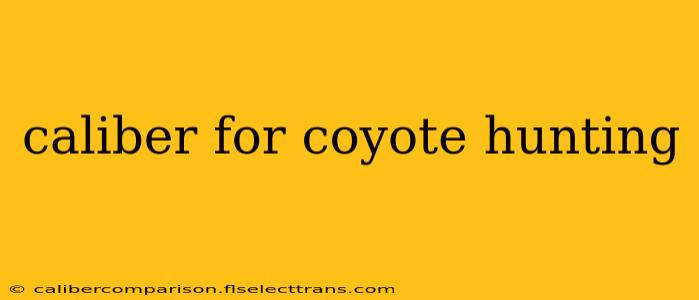Coyote hunting presents unique challenges, demanding a firearm and caliber capable of delivering a clean, humane kill at varying ranges. The best caliber for you depends heavily on your hunting style, terrain, and personal preferences. This guide explores popular choices, examining their strengths and weaknesses to help you select the ideal caliber for your next coyote hunt.
Understanding the Factors Influencing Caliber Selection
Before diving into specific calibers, let's consider the critical factors influencing your choice:
1. Effective Range:
Coyotes can be elusive and may present shots at various distances. A longer-range cartridge offers more versatility, especially in open terrain. Shorter-range cartridges are suitable for closer encounters and wooded areas.
2. Cartridge Availability and Cost:
Ammunition availability and cost are significant considerations. Popular calibers generally offer readily available ammo at competitive prices.
3. Recoil:
Recoil management is crucial, especially during extended hunting sessions. Higher-caliber rounds often produce more recoil, which can affect accuracy and shooter comfort.
4. Ballistic Performance:
Factors like bullet weight, velocity, and energy impact the effectiveness of the round. Heavier bullets offer better penetration, while higher velocities translate to flatter trajectories and longer ranges.
Top Calibers for Coyote Hunting: A Detailed Comparison
Several calibers consistently prove effective for coyote hunting. Here's a closer look at some popular choices:
1. .223 Remington/5.56 NATO:
- Pros: Relatively low recoil, affordable ammunition, readily available, flat trajectory, excellent for longer ranges.
- Cons: May require precise shot placement for clean kills, particularly on larger coyotes or at extended ranges. Can be underpowered at extreme distances.
2. .22-250 Remington:
- Pros: High velocity, flat trajectory, excellent for longer-range shots, good accuracy.
- Cons: Higher recoil than .223, can be more expensive than .223, potentially excessive for close-range encounters.
3. .204 Ruger:
- Pros: High velocity, flat trajectory, lighter recoil than .22-250, very accurate.
- Cons: Can be less effective on larger coyotes at longer ranges. Ammunition availability might be less widespread compared to .223.
4. .270 Winchester:
- Pros: Powerful round, excellent for larger coyotes or at longer distances, good penetration.
- Cons: Significant recoil, more expensive ammunition, potentially overkill for close-range shots.
5. .308 Winchester:
- Pros: Powerful, versatile cartridge, effective at longer ranges, good for larger game if needed. Widely available ammunition.
- Cons: High recoil, potentially more than necessary for coyotes. More expensive than some other options.
Choosing the Right Caliber for You
The "best" caliber is subjective and depends on your individual needs and hunting style. Beginners might find the .223 Remington or .204 Ruger more manageable due to lower recoil. Experienced hunters seeking longer-range capability might favor the .22-250 Remington or .270 Winchester. The .308 Winchester offers versatility but comes with significant recoil.
Remember to prioritize shot placement over caliber. A well-placed shot with a smaller caliber is far more effective than a poorly placed shot with a larger round. Consider taking a hunter safety course and practicing extensively at the range before heading out to hunt.
Beyond the Caliber: Essential Coyote Hunting Considerations
While caliber choice is vital, several other factors contribute to successful coyote hunting:
- Rifle Selection: Choose a rifle that is comfortable to shoot and well-suited for your chosen caliber.
- Optics: A good scope is essential for accurate shots, particularly at longer ranges.
- Ammunition Selection: Select high-quality ammunition specifically designed for hunting.
- Hunting Techniques: Employ effective hunting techniques, such as calling and stalking, to increase your chances of success.
Choosing the right caliber is a crucial step in successful coyote hunting. By carefully considering the factors discussed above and selecting the caliber that best matches your hunting style and preferences, you'll be well-equipped for a productive and ethical hunt.

